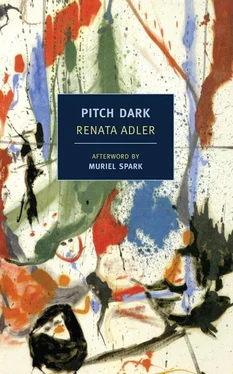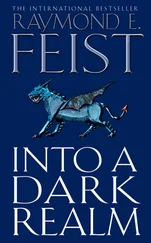Renata Adler - Pitch Dark
Здесь есть возможность читать онлайн «Renata Adler - Pitch Dark» весь текст электронной книги совершенно бесплатно (целиком полную версию без сокращений). В некоторых случаях можно слушать аудио, скачать через торрент в формате fb2 и присутствует краткое содержание. Год выпуска: 2013, Издательство: NYRB Classics, Жанр: Современная проза, на английском языке. Описание произведения, (предисловие) а так же отзывы посетителей доступны на портале библиотеки ЛибКат.
- Название:Pitch Dark
- Автор:
- Издательство:NYRB Classics
- Жанр:
- Год:2013
- ISBN:нет данных
- Рейтинг книги:3 / 5. Голосов: 1
-
Избранное:Добавить в избранное
- Отзывы:
-
Ваша оценка:
- 60
- 1
- 2
- 3
- 4
- 5
Pitch Dark: краткое содержание, описание и аннотация
Предлагаем к чтению аннотацию, описание, краткое содержание или предисловие (зависит от того, что написал сам автор книги «Pitch Dark»). Если вы не нашли необходимую информацию о книге — напишите в комментариях, мы постараемся отыскать её.
Pitch Dark Composed in the style of Renata Adler’s celebrated novel
and displaying her keen journalist’s eye and mastery of language, both simple and sublime,
is a bold and astonishing work of art.
Pitch Dark — читать онлайн бесплатно полную книгу (весь текст) целиком
Ниже представлен текст книги, разбитый по страницам. Система сохранения места последней прочитанной страницы, позволяет с удобством читать онлайн бесплатно книгу «Pitch Dark», без необходимости каждый раз заново искать на чём Вы остановились. Поставьте закладку, и сможете в любой момент перейти на страницу, на которой закончили чтение.
Интервал:
Закладка:
Those for whom there was, first dimly, then more bright, then dimly again, a possibility. Which, though dimly, perhaps still exists, but which they know, have somehow always known, would never come to anything. They were never, how can I put this, going to be a part of life. It is as though, going through a landscape, through the seasons, in the same general direction as everybody else, they never quite made it to the road. Through the years, humanity, like a tide of refugees or pilgrims, shoeless and in rags, or in Mercedes, station wagons, running shoes, were traveling on, joined by others, falling by the way. And we, joined though we may be, briefly, by other strays, or by road travelers on their little detours, nonetheless never quite joined the continuing procession, of life and birth, never quite found or made it to the road. Whose voice is this? Not here. Not mine.
But in London, no, what happened first is that we arrived, one night, at Heathrow. It was my third flight, that fall and winter, standby, New York/London. A day flight. And on the plane, I met Anne and Matthew, friends whom I had not seen in years, since the day they married. Anne had just been in the hospital; so had I. They were returning to England, where they live. That night, as Anne and I were waiting for Matthew to bring their car from the parking lot, we saw two military men, Americans, climb into the back of a large black limousine. When Matthew drove up, and had put our suitcases in the trunk, the limousine still stood there, blocking our way. Suddenly, there were popping noises; and, out of both its front and back doors, arms extended, holding out frothing bottles of champagne. The arms withdrew; they were clearly celebrating in that limousine. More popping sounds, and again the military sleeves, the frothing bottles. We thought they must be welcoming some beloved officer. But then, Anne said, You don’t suppose they’ve freed Colonel Dozier? Not a chance, we all thought; we assumed he had been dead for months. But when Matthew turned on the car radio, it turned out to be true: Dozier freed from the Italian Red Guard. Well, who now remembers Colonel Dozier. But it seemed to us then, in the car, an omen, good in every way.
Can it be done on friendship? I don’t think so. On intelligence? No. On hope, on love, on fame, on trust, on family, memory, convictions. I don’t know. But if, one day, old, and propped against the pillows, or rocking in chairs together, holding hands perhaps, by the fireside; if, looking back on our lives, older now, looking back on our lives we could say, It was all right, looking back, even the things that looked like mistakes, even the apparent misfortunes at the time, they were not mistakes, they were only part of our lives till now. We have been lucky together. We are drinking, by the fireside, and thinking, why did we worry, what was that remorse. We are here still, and what happened, what we did was right. Then we will have done it. Look here. But can we live this way.
In London, on Hays Mews, in fact, the phone rang. The phone calls began. But, no, in London, as well, an elderly priest made a pass at me. I thought, I must be mistaken, I have misunderstood it, he thinks I’m sad; it is his custom to take sad parishioners in his arms, to console them, but no. There was no mistaking it, a strong, self-confident, by no means repellent or ungentle pass. And I burst into tears. When we had settled then, perhaps more improbably still, on the sofa, with drinks, I said, Father, do you think I should seriously consider becoming a Roman Catholic. He said, Heavens no. I thought, It’s come to this. And yet. I cannot explain by what series of misunderstandings, or perhaps not misunderstandings, by what sequence of events we had arrived at this moment. He took out his wallet and showed me pictures of the young woman and small children whom he referred to as his Italian family. He phoned. He even sent a telegram, signed love Father Riley. And yet. Well, what did we do instead, I ask you that, what shall we do instead. But I believe, you know, I actually, naturally think, in long, sad, singing lines.
And in London, there was that lunch, in a small restaurant, with Annabel. I asked about her children; and in talking about her younger son, she said, You know, he flew the other day. I said, Flight school? She said, No, in his meditation, actually. I asked how it was. She said, Well, you know, it rather hurt. I mean, he only rose six inches, and he didn’t fly for long. But he’s lanky, and as he hadn’t expected to fly so soon, he said it hurt rather when he came back down. She was smiling as she told this; I was smiling. But we both believed it, and were pleased for him. Moreover, there has already been a practical application: he meditates with his grandmother, from time to time, and it helps with her arthritis; partly the meditation, in and of itself, but also because, perhaps herself on the brink of flying, she becomes so light.
She said, Of course I haven’t left. But she really thought, at first, it was too late, she had been too long alone by then. He said, You see, I didn’t know. I said, I would never leave.
This is about friendship and my tantrum and how I both was and failed to be a citizen of my time. The conference on refugees was meeting that week, under UN auspices, in Geneva. We were sitting down to lunch, Diana, daughter Sylvia, a few other guests, and I. John was off covering the conference, which had begun, as international conferences routinely began in those years, by voting to exclude Israel. And Diana’s daughter said, in that embittered, bored tone children of highly political parents often have: I suppose, all the same, they’ll do nothing, as usual, this year, about the Libyan refugees. The what? I said. She said, still somehow cynical, resigned, pained, complacent, the Libyan refugees. I said, But there are no Libyan refugees. Diana explained that the Libyans are rich, that their country is sparsely populated and rich with oil. Well, then, the Palestinians, the daughter said. There was a pause. Then, Diana, perhaps to turn the bitter tone at least to good effect, said, You know, it’s very interesting. People used to denounce hijackings. What they do not realize is that this is the means, by the hijackings and then secret blackmailing agreements with the airlines, by this means the Palestinians have been supporting the people in the camps. Because the camps, as you know, are a UN responsibility. But from the UN they were only getting one dollar, per month, per family. I said, rather mildly, Surely not, surely it was more than that. And she said, No, it is true; I know it for a fact. I said, But Diana, when were the first hijackings, the early sixties, and the UN mandate began in 1948; surely, in the years between, the Palestinians were living on something. And she said, Yes, on one dollar, per family, per month. It is simply not generally known. And as she went on, explaining, as she thought, what had happened in the Middle East, I said, with an inner irony but ashamed of myself for lying this low, It is odd that no one has ever written this history. Diana said, Pierre, of course, will write it, in his book about Israel and the Palestinians. Until now, he has not had time. But, when he has time, he will write it. In his research, at Princeton, he has found many documents, previously unknown. And Sylvia muttered something, which I thought included the word collaboration. I said I hadn’t understood. There was a pause. Sylvia said, more loudly, About the collaboration. I said, Collaboration between whom? And Diana said, Well, you see, Pierre has discovered in his research these documents, at Princeton, about collaboration between the Nazis and the early Zionists. I said, Surely, Diana, that would be a considerable scoop, and it is odd that Pierre has not gotten around to it. She said, Yes, it would be of enormous value to the Palestinians. Pierre has simply, so far, not had the time. I said, Look, there are not, there do not exist, at Princeton or elsewhere, previously unknown documents about such a collaboration. It is the most exhaustively, publicly, documented period. Ah well, Diana said, certain interests of course would like to suppress them, but Pierre has seen them; the documents exist.
Читать дальшеИнтервал:
Закладка:
Похожие книги на «Pitch Dark»
Представляем Вашему вниманию похожие книги на «Pitch Dark» списком для выбора. Мы отобрали схожую по названию и смыслу литературу в надежде предоставить читателям больше вариантов отыскать новые, интересные, ещё непрочитанные произведения.
Обсуждение, отзывы о книге «Pitch Dark» и просто собственные мнения читателей. Оставьте ваши комментарии, напишите, что Вы думаете о произведении, его смысле или главных героях. Укажите что конкретно понравилось, а что нет, и почему Вы так считаете.












